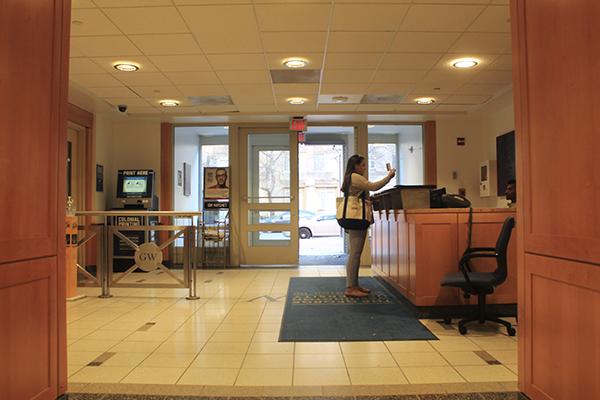The University increased security at the entrance to some residence halls recently, students living in those buildings said.
GW added community service aide shifts at the doors to residence halls in buildings like Potomac House and Shenkman Hall near Halloween weekend this year, student leaders said. The change comes after students and community members noticed a lack of CSA coverage in residence halls earlier this semester, which University officials attributed to changing crime trends and uses for the buildings compared to last year.
Students who live in the building said security in Potomac House increased to nearly 24/7 coverage at the end of October, and CSAs started being more frequently stationed at the entrance to the residential area of Shenkman Hall at about the same time. Student leaders say they have noticed that security has increased in most residence halls on campus.
University spokeswoman Maralee Csellar said in an email that the University “continually” reviews its security practices and “re-adjusts as necessary.” She declined to say which changes the University made to CSA coverage in buildings or what factors the University considers when assigning CSA shifts.
“The University analyzes a variety of factors when determining its safety and security staffing within all buildings, with the goal of creating a safe environment for all GW community members,” she said.
A former CSA, who left the program this semester and spoke on the condition of anonymity, said GW changed schedules for CSAs this year to add more shifts during the day and pulled back the hours that CSAs operate at night. She said GW’s safety and security department typically doesn’t tell CSAs why officials change the security shifts.
“A lot of things have changed,” she said. “There was a whole revision of the shifts that happened with all of the dorms, not only Potomac.”
Potomac House Hall Council President Austin Meo said parents had raised concerns when they noticed no security presence in the residence hall during parents’ weekend last month. The added CSA coverage in the building came shortly after that, he said.
He added that the Residence Hall Association executive board asked members of the Potomac House Hall Council to fill out forms when entering the building in order track when there was a CSA there.
“There was a point during parents’ weekend when anyone could just walk in if you could get in through at least the first swipe. I think it was a concern, not only for the students,” Meo said.
One University Police Department officer said there traditionally have been UPD officers stationed at the front desk in Potomac Hall until this past summer. He said he didn’t know why the decision had been made to cut the post there.
The officer, who spoke on the condition of anonymity because UPD officers are not allowed to speak to the media, said he doesn’t know if other changes will be made to the security in residence halls.
“If I were a parent, I would be concerned too,” he said.
RHA President Mike Massaroli said he has noticed an increased security presence in residence halls during the semester, citing Potomac House as an example. He said students living there complained about the added security coverage there mid-semester after they had grown accustomed to not having to show their GWorld to a CSA at the door.
“We’ve heard from our hall council that it had gotten to the point where there was no CSA there so often that sometimes residents would just be using the desk to do homework, to study,” he said. “I think it’s being done a little more conscientiously now.”
Potomac House residents posted in a Facebook group complaining about the increased security presence in the building early last month. One student wrote in the group that the increased security took away from the residents’ freedom to bring guests into their rooms without having to sign them in.
The residents held a town meeting within the residence hall for students to discuss the added security. Massaroli said the meeting quelled concerns students had about the inconvenience of having to tap in after they were used to not having anyone checking that they are allowed in the building.
“This is really the way that it always has been, it has been for years, and that it should and will continue to be,” he said.







